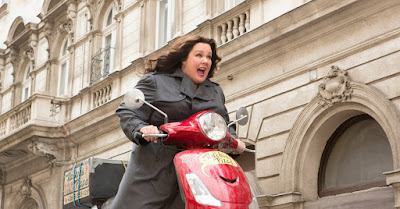Although “Spy” emanates from the mind of Paul Feig its opening scenes evoke Nancy Meyers. Susan Cooper (Melissa McCarthy), CIA bureaucrat in the vermin-infested offices of Langley, her desk covered in post-its like she’s an insurance adjustor at Allied, talks a suave Americanized version of 007, expositorily named Bradley Fine (Jude Law), through the paces at a glamorous locale. As he offs the bad guys of whom she keeps him expertly abreast, their dynamic falls into place. He ribs, she swoons, and when the mission ends and they have dinner, it becomes clear that she lusts for him though these feelings will never be reciprocated. It’s like she's Kate Winslet in “The Holiday” and he’s Rufus Sewell. But rather than house swapping and meeting a new man to unburden her emotions, Cooper’s vacation takes the form of a black-op, as she graduates from analyst to agent.
“Spy” turns on Cooper’s beloved Fine being murdered at the devious hands of Rayna Boyanov (Rose Byrne), a Bulgarian villain with a beehive of hair and an icy superiority complex who knows the location of a superbad nuke that another superbad dude wants. Since Rayna knows the identity of all CIA operatives, Cooper is put in the field under increasingly stereotypical secret identities, like a companionless loser with ten cats. Rather than stick to the personas the CIA has engendered for her, however, Susan rebels, dressing how she wants, acting and saying what she wants, putting a brush to the easel of her self in the midst of a Spy Game and painting with abandon. Her BFF, Nancy, back at basecamp, played by Miranda Hart with miraculous comic timing, distills all of “Spy” down to its essence when she cries “I cannot condone your sexy but reckless actions!” They can’t, maybe, but we can.
The hook in these movies is typically that an agent has gone rogue or is playing by his/her own rules. Cooper, however, isn’t playing by her own rules so much as writing a whole new set of them as she goes. You might recall McCarthy’s previous vehicle “The Heat”, a film in which she and Sandra Bullock are a pair of star crossed cops made to prove themselves professionally to doubtful fellow officers. There is no such proving ground in “Spy.” Ridiculing such cinematic sexism are Cooper’s fellow male undercover cohorts, Aldo (Peter Serafinowicz), an Italian operative who seemingly treats every female’s body as his personal playground, and, even better, Rick Ford, a chauvinist blowhard played with gleeful relish by Jason Statham as a kind of funhouse mirror version of every other character he’s ever played. He’s vigilantly insistent on hanging around against orders to save the day, only to continually make a mess that Cooper has to clean up.
McCarthy's characters typically come intact from moment one going eighty-five in a sixty-five. Here, however, her character morphs from a decided timidity to her characteristic ferocity. That awakening is tied, wonderfully, weirdly, to her relationship with Rayna. The latter, surrounded by a gaggle of obligatorily incompetent henchmen, winds up employing the deep cover Cooper as her personal bodyguard, a plot twist that generally makes no sense schematically but works like gangbusters emotionally. Repartee in spy movies often is packed with debonair double entendres, yet the dialogue here is an avalanche of obscene insults, as if the two of them are bonding strictly by giving one another shit. They’re like a wicked feminist spin on the buddy cops who somehow get along even though they don’t, and their antagonistic give-and-take is how Cooper finds her secret agent woman sea legs. Her and Rayna's final moment on screen contains a couple curse words but also a couple smiles, like they both know they’ll never quite encounter such an impeccable foil again.
Rose Byrne effortlessly embodies drolly hilarious haughtiness, and Miranda Hart deftly accentuates every scene in which she appears, but the film is undoubtedly McCarthy’s. The stable of remarkable performers in “Spy” orbit entirely around her, and her performance carves out authenticity from absolute absurdity. “Spy” is a violent film, perhaps surprisingly so given its caricatural nature; yet, in a way, “Spy” treats violence more knowingly than any standard issue frowning somber action drama. When a knife goes through a hand, and it does, it’s not nothing-to-see-here, it’s holy-gods-I-can’t-believe-that-just-happened. Neither can Cooper, and that brings her down to our level.
One death is so grisly that Cooper instantly combusts into projectile vomit, the finest use of an otherwise outmoded gag I can recall. She barfs and then she gets right back to beating in people’s skulls and cracking wise. The film is exaggerated, she’s palpable, and together they sing in beautiful foulmouthed harmony.
Monday, June 08, 2015
Subscribe to:
Post Comments (Atom)





2 comments:
I'm definitely going to have to rent this.
Got a kick out of it. Here's my review if you're interested. http://www.reelgood.com.au/review-spy-2015/
Post a Comment